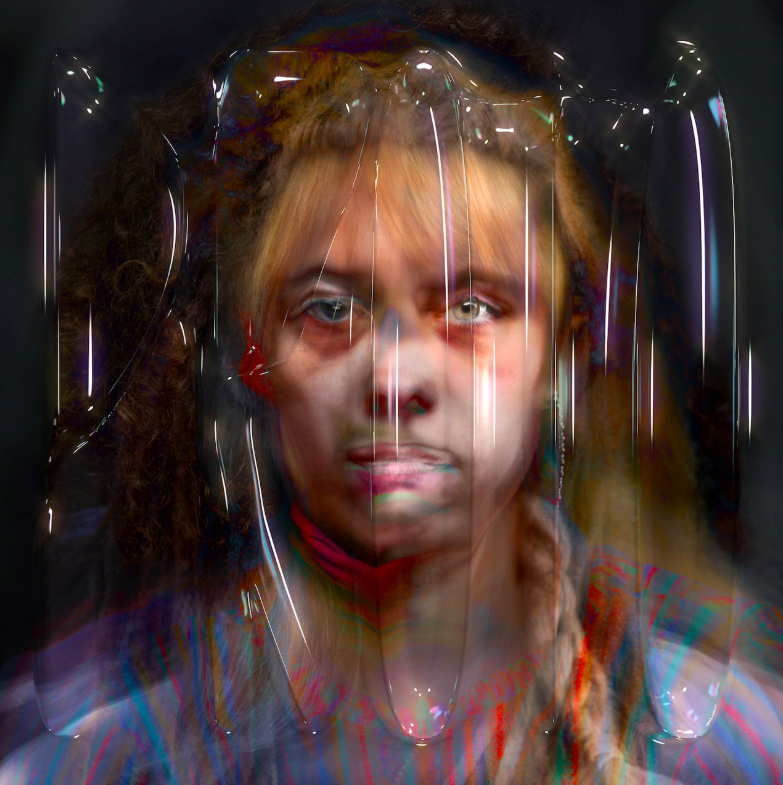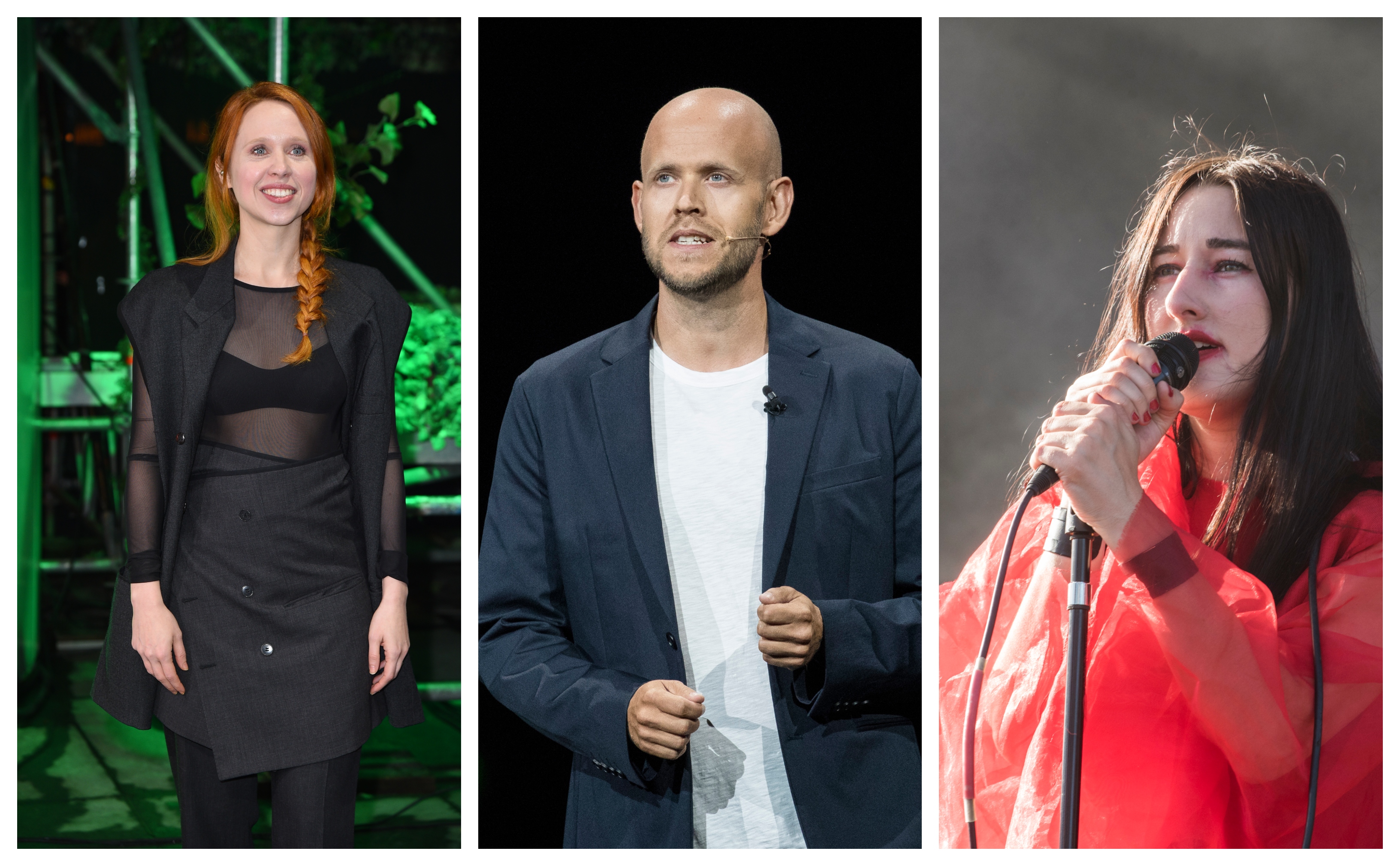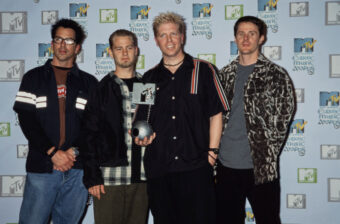Writing about machine consciousness in a 1974 New York Review of Books letter to the editor, the philosopher Hubert L. Dreyfus said, “Intelligence is not a piecemeal affair.” He was explaining what he called the commonsense knowledge problem: the idea that artificial intelligence is limited by its inability to understand context beyond the facts presented in a given problem. Computers could string together a logical progression of nouns, adjectives, and vowels to make a sentence, but without context, they would fail to derive true meaning, missing even the moral of a simple folk tale. In an age wracked by AI anxiety, Dreyfus’s writing gives a comforting perspective, with a pure distinction between the human and inhuman. The music of Holly Herndon suggests that the line isn’t so clear. On her latest album PROTO, the experimental pop composer explores the gaps between the brain and machine, delighting in redefining the boundaries of each.
Herndon, who recently completed a doctoral in musical arts at Stanford, has always taken an academic approach to pop. Her 2012 debut Movement explored the intimacy of the laptop, and her 2015 second album Platform critiqued the ways that corporations use technology to leech our data. Both albums foregrounded intellectual concerns, but also indulged in the sonic immediacy of dance music: metallic drums; low, wobbly basslines. On PROTO, Herndon explores acoustic realms, calling on global folk traditions and vast vocal ensembles to train a new kind of ensemble member: an artificial intelligence she dubbed “Spawn.” The result is a bit of an inversion for Herndon: instead of a conceptual pop album, PROTO is a concept, founded in pop traditions.
Like a scientist naming a new species, the album’s song titles attempt to render Spawn’s output in recognizably human terms. Take opening track “Birth,” a shivering gothic number that features a sputtering synthesized vocal from Spawn. Babbling unintelligibly in a humanoid register, Spawn reveals that, even forty years into the study of machine consciousness, AI is still in its infancy. But on “Crawler,” symbolic of both the next logical step for an infant and the pervasive technology that catalogues our online existence, the robotic vocals take on a steadier timbre, and a chorus of human voices pine for enlightenment: “Why am I so lost?” “Bridge” features the artist Martine Syms reading a violent text: “Fight comes first,” she says, as the AI repeats her flat tone. Spawn, despite her massive GPU, is still a robotic baby, learning slowly through mimesis.
PROTO, in contrast to Herndon’s other work, gives a glimpse at the process behind the towering electronic soundscapes for which she is known. “Canaan” and “Evening Shades” are parenthetically designated as “live trainings” for Spawn, and feature members of Herdon’s ensemble singing to the AI. “Canaan,” a raw vocal adaptation of a traditional hymn, features an eerie folk harmony, and “Evening Shades,” with a co-ed chorus singing as Spawn gives a ghostly echo, sounds like a religious gathering. Including these tracks, as well as “Godmother,” a disquieting single featuring Spawn reconstructing a stem from longtime Herndon collaborator Jlin, is a gesture similar to providing an appendix to a research paper: the variables and results of this AI experiment are all on full display.
For listeners coming into the album without knowledge of its overarching concept, PROTO is also full of pop-forward compositions that are striking in their own right. “Alienation,” a propulsive dance track, features Herndon’s impressive vocal range clipped by digital processing in its upper register, surrounded by synths that shuffle, crest and crash. “Fear, Uncertainty, and Doubt” uses post-processing to create a shimmering ripple effect with Herndon’s voice, a buoyant and bubbling rhythm that renders her singing almost Moog-like. Tracks like “Eternal,” which blends human vocals with pulsing sequencers, and “Frontier,” a Sacred Harp-inspired call-and-response with a woody polyrhythm, serve both purposes: at once demonstrative of Spawn’s upbringing and emotionally evocative as standalone avant-pop.
For a record about the development of machine cognition, PROTO is remarkably human at every turn. Instead of a demonizing overlord, Herndon reveals artificial intelligence as a relatively infantile experiment, one not unlike the checkers-playing machines on the rise during the mid-20th century: all data, with little in the way of context. But rather than using that naiveté as a way of keeping A.I. at arm’s length, Herndon envisions it as a starting point for common ground. Perhaps, as song titles like “Canaan” and “Frontier” suggest, Herndon sees herself as a pioneer, working to bridge that commonsense gap described so many decades ago. Musical intelligences need not only to read classical compositions, but to take a lesson in musicology: to study the American songbook and global folk traditions, to learn what music means to the people who play and listen. And PROTO takes the radical position that human empathy is the best training set for a conscious, computerized musician. On “Extreme Love,” Herndon’s niece recites a text about distributed intelligence, a favorite topic of Herndon’s. “Is this how it feels like to become the mother of the next species?” she asks inquisitively. PROTO provides no easy answers, but it isn’t scared of the question, either.





